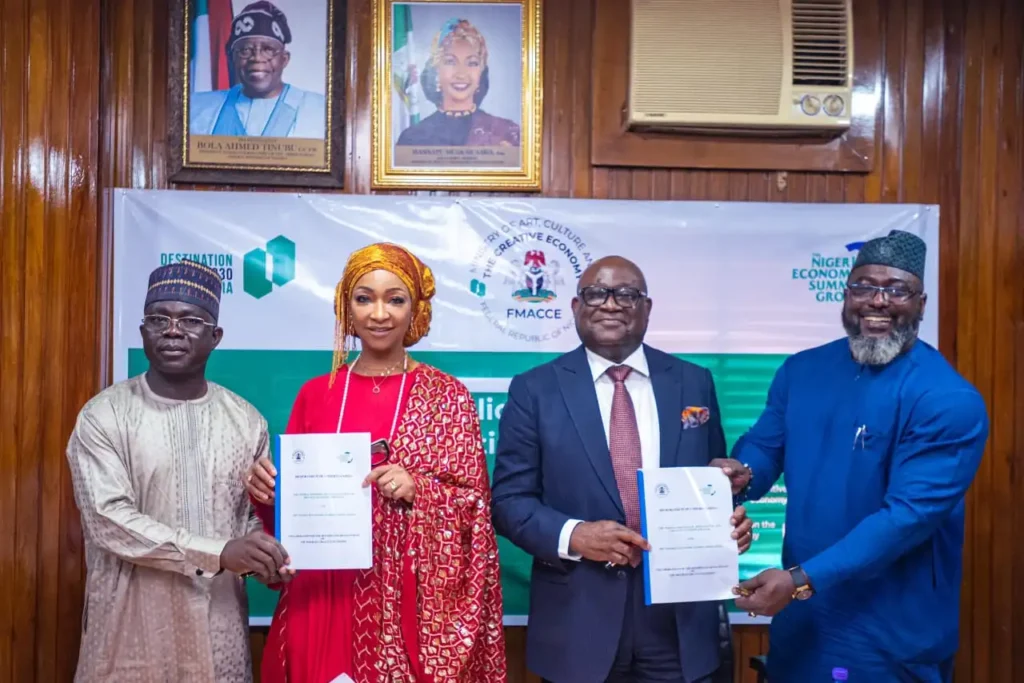CurrentReport Blog In a significant move to bolster Nigeria’s creative sector, the Ministry of Arts, Culture, and the Creative Economy has joined forces with the Nigerian Economic Summit Group (NESG). This strategic partnership aims to develop a comprehensive framework for financing the growth of the creative industry, a crucial step in unlocking its vast potential and driving economic development.
A press statement from the Minister’s Special Assistant on Media and Publicity, Nneka Ikem Anibeze, shared with journalists in Abuja, outlined the ambitious goals of this collaboration. The Memorandum of Understanding (MoU) between the Ministry and NESG is designed to revitalize the sector, with targets to contribute significantly to Nigeria’s Gross Domestic Product, aiming for a $100 billion impact by 2030 and the creation of two million jobs by 2027.
During the signing ceremony, Minister Barrister Hannatu Musa Musawa expressed her optimism about the partnership’s potential to transform Nigeria’s creative industry into a major economic contributor and revenue generator.
“Today, we take a bold step forward in fulfilling this mandate of the Ministry in partnership with NESG, a leading private sector-led think tank dedicated to transforming Nigeria into an open, sustainable, and globally competitive economy,” said Minister Musawa. She emphasized the importance of this collaboration in establishing a robust governance structure for the arts, culture, and creative industries.
Building on the foundation of the draft Cultural Policy, the Ministry aims to promote cultural integration, preserve national values, and safeguard Nigeria’s rich cultural heritage. This policy will outline clear objectives and strategies for cultural development, language preservation, historiography, and the promotion of cultural diversity and inclusivity.
The Ministry and NESG have co-created a policy thrust for a comprehensive national policy on the creative economy. This policy will provide strategic direction, outline key objectives, and establish regulatory mechanisms to foster growth, innovation, and sustainability within the sector. Once approved, the policy will be presented to the National Assembly for assent, aiming to create a Central Authority for Art, Culture, and the Creative Economy, and establish a fund in alignment with the Ministry’s Key Performance Indicator (KPI) No. 2.
Dr. Tayo Aduloju, Chief Executive of NESG, described the MoU as a pivotal moment for the Nigerian creative industry. He highlighted the role of the Creative Economy Working Group in driving public-private dialogue and facilitating collaboration among stakeholders. This group will serve as a stable platform for decision-making, fostering industrial associations, and promoting entrepreneurship and employability among youth across the country.
Permanent Secretary of the Ministry, Mr. James Sule, hailed the MoU as a landmark achievement in revitalizing the sector. He emphasized the partnership’s goals of fostering economic growth, showcasing homegrown talent, and attracting local and international investment. NESG’s assistance will be crucial in reviewing and amending policies, regulations, and legislative frameworks to better support the cultural and creative economy.
This historic partnership marks a new era for Nigeria’s creative industry, promising transformative growth and a brighter future for the country’s youth, creatives, and economy as a whole.
The Ministry and NESG are committed to working together to address infrastructural gaps, facilitate knowledge exchange, and promote informed decision-making through meetings, conferences, events, festivals, and symposia.












